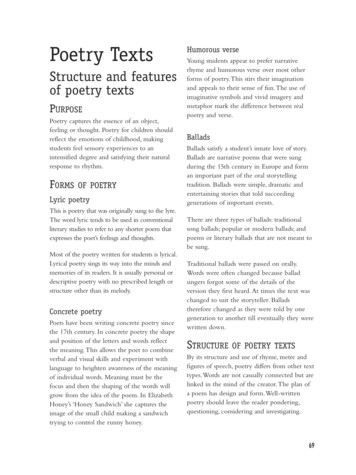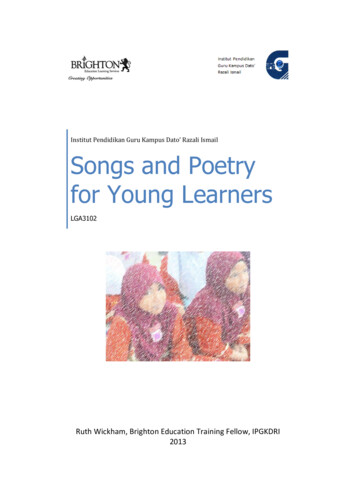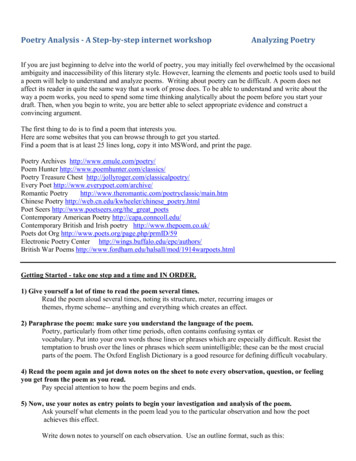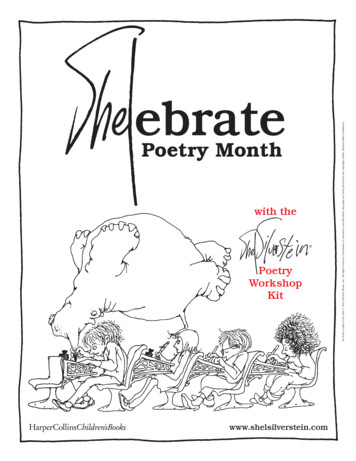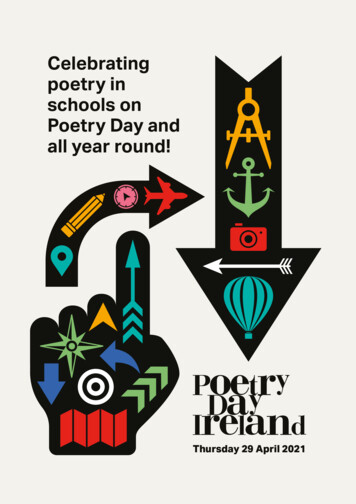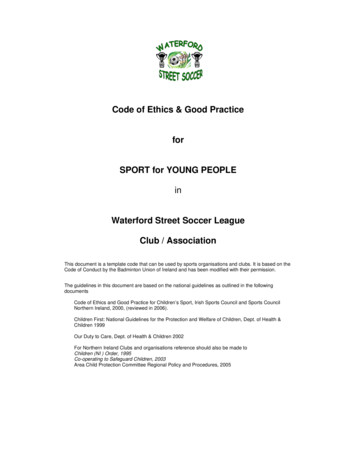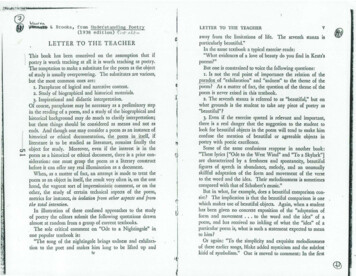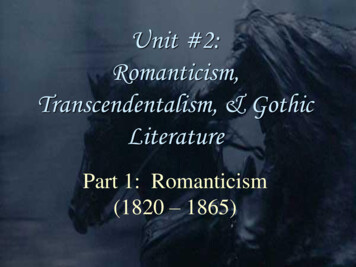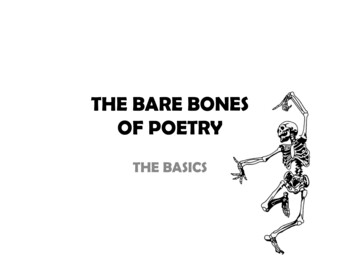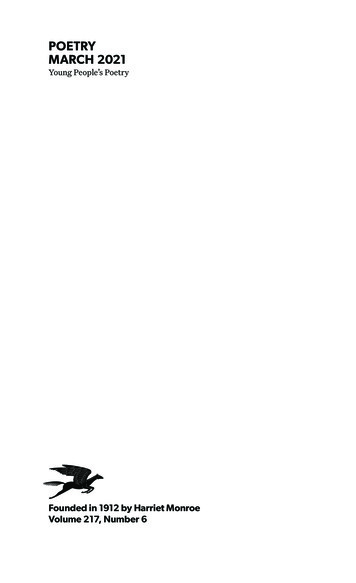
Transcription
POETRYMARCH 2021Young People’s PoetryFounded in 1912 by Harriet MonroeVolume 217, Number 6
CONTENTSPOEMSJACQUELINE WOODSON579WeightEvery day as a wide field, every pageIllustration by Jillian TamakiNAOMI SHIHAB NYE581JOYCE SIDMAN583One of UsLUIS DANIEL SALGADO584Mi CasaIllustration by Rafael LópezCEDAR SIGO586What did you learn here? (Old Man House)TANAYA WINDER587 And I wonder where you areBeingUncharted Territory of GriefIllustration by Colin LaurelCORNELIUS EADY592 “I am here because somebody survived”HEID E. ERDRICH594The Racist BoneHow It Escaped Our AttentionSUMA SUBR AMANIAM595 A smile always healsFilterIllustration by Lisa DesiminiMARILYN NELSON598 The Floatin BabyIllustration by James RansomeARI TISON602The Storyteller Gets Her NameMAHOGANY L. BROWNE603 The AcheThis Is the HoneyIllustration by Weshoyot AlvitreMARIANA LLANOS606 Invisible ChildrenThe Line of FireWarIllustration by Jolene (Bean) Nenibah YazzieKIM STAFFORD610At the Student Poetry ReadingEquinox: Greta in PolandBefore the Rains Had ComeNATHALIE HANDAL613Phenomenal DaughterLove LetterOthers Are UsNOUR AL GHR AOWI616 Truth is I would like to escape myselfIllustration by Linda Dalal SawayaPAT MOR A618My RockThe Only MeCHER A HAMMONS620 ClarinetIllustration by Rudy Gutierrez
MOSAB ABU TOHA622my grandfather and homeThings You May Find Hidden in My EarCHEN CHEN625SummerThe School of the UnschoolableK AR A JACKSON628 the world is about to end and my grandparentsare in loveanthem for my belly after eating too muchtribute for when i’m quietIllustration by Rhea VegaNIKKI GRIMES632 The Last WordStompPoemsIllustration by Shadra StricklandKIMBERLY BLAESER636 About Standing (in Kinship)Illustration by Neebinnaukzhik SouthallDAWN QUIGLEY638Blue Earth BanksOde to LangstonRENÉE WATSON640This Body IIELIZABETH ACEVEDO641A Daughter Named After NinaManhunt or Ode to First KissesTINA BOYER BROWN644 RespectabilitySchool—12:15MICHAEL SIMMS647 The Summer You Learned to SwimWho Will Tell Them?Illustration by Edel RodriguezLINDA SUE PARK650Red-Crowned CraneNowhere Else to GoPADMA VENK ATR AMAN652UndoneWhenever you see a treeMARGARITA ENGLE654 The Care and Feeding of PoetryIllustration by Raúl ColónCONTRIBUTORS657
MARGARITA ENGLE Guest EditorNAOMI SHIHAB NYE Guest EditorJACQUELINE WOODSON Guest EditorHOLLY AMOS Interim EditorLINDSAY GARBUTT Interim EditorFRED SASAKI Interim EditorHANNAH KUCHARZAK Marketing AssociateMEAGHAN WINSTON Digital Magazine ProducerPENTAGR AM Design ConsultantCOLIN LAUREL Cover ArtistPOETRYMAGAZINE.ORGA publication of the Poetry FoundationPrinted by the Sheridan PressPoetry, March 2021, Volume 217, Number 6Poetry (issn: 0032-2032) is published monthly, except bimonthly July/August, by the Poetry Foundation. Addresseditorial correspondence to 61 W. Superior St., Chicago, IL 60654. Individual subscription rates: 35.00 per yeardomestic; 47.00 per year foreign. Library/institutional subscription rates: 38.00 per year domestic; 50.00 per yearforeign. Single copies 5.95, plus 2.00 postage. Address new subscriptions, renewals, and related correspondenceto Poetry, PO Box 37156, Boone, IA 50037-0156 or call 800-327-6976. Periodicals postage paid at Chicago, IL, andadditional mailing offices. postmaster: Send address changes to Poetry, PO Box 37156, Boone, IA 50037-0156. Allrights reserved. Copyright 2021 by the Poetry Foundation. Double issues cover two months but bear only one number.Volumes that include double issues comprise numbers 1 through 5. Volume 216 comprises numbers 1 through 4. Visitpoetryfoundation.org for submission guidelines and to access the magazine’s online submission system. Available inBraille from the National Library Service for the Blind and Print Disabled and from the Library of Congress. To requestthe Braille edition, call 888-657-7323, email nls@loc.gov, or visit loc.gov/nls. Available on microfilm and microfichethrough National Archive Publishing Company, Ann Arbor, MI. Digital archive available at JSTOR.org. Distributed tobookstores by American News Company, Media Solutions, Small Changes, and Central Books in the UK.
POEMS
Jacqueline WoodsonWeightWhen I was a kid, there was this song that played on the radio all the time. Ittalked about a road that was long and a brother who had to be carried on it.The singer said the brother wasn’t heavy. That he was, simply, his brother.And that line repeated again and again—He ain’t heavy. He’s my brother.And something about the way the singer’s voice hugged these words, proclaimed them to the world, caught in the back of my throat. Making it hardto move. To swallow. I didn’t know then—at nine, ten, eleven—that this waslove. That this was community. That this was about a greater good. If theroad is long, it doesn’t matter what you weigh—I will carry you.As a child, I loved the stories inside of songs. And the poetry. I loved howthe music existed as air and water around the words—an energy to helpthem move deeper and more beautifully into our minds—and from there,our memories.The road has been long. As I sit down to write this, I am so grateful foreach of you on it with me. As I read through the selections in this journal, Iam carried back to that place in my childhood—where words stopped me,made me have to remember how to swallow, said Don’t forget to breathe.And now—here we all are—at this moment, past the many we’ve lostwho weren’t able to breathe into this new day. Past the beginnings of arevolution that is now a movement we have chosen to walk beside, to raiseour fists up into. Past a country that feels like it’s losing its mind. Past amoment before we had to remember to grab our masks when we grabbed ourwallets and keys. And still—ahead of us, the road keeps winding into a placewe cannot yet see.So on we go.JACQUELINE WOODSON579
Illustration by Jillian Tamaki
Naomi Shihab NyeEvery day as a wide field, every page1Standing outsidestaring at a treegentles our eyesWe cheerto see fireflieswinking againWhere have our friends beenall the long hours?Minds stretchingbeyond the fieldbecometheir own skiesWindows doorsgrow moreimportantLook through a wordswing that sentencewide openKneeling outsideto findsturdy greenglistening blossomsunder the breezethat carries us silentlyNAOMI SHIHAB NYE581
2And there were so many more poems to read!Countless friends to listen to.We didn’t have to be in the same room—the great modern magic.Everywhere together now.Even scared together nowfrom all points of the globewhich lessened it somehow.Hopeful together too, exchangingwinks in the dark, the little lights blinking.When your hope shrinksyou might feel the hope ofsomeone far away lifting you up.Hope is the thing .Hope was always the thing!What else did we give each otherfrom such distances?Breath of syllables,sing to me from your balconyplease! Befriend mein the deep space.When you paused for a poemit could reshape the dayyou had just been living.NAOMI SHIHAB NYE582
Joyce SidmanOne of Us“That kid is weird,” saysthe teacher, flipping her shining hair.“I don’t know where he’s at.”Indeed, he is quietin the way of a giraffe:ears tuned to something we can’t hear.He turns his sleepy eyes on me—chocolate brownwith long, extraordinary lashes—as I hand him a seashell:something to write about, you know,something to focus on.Suddenly, silently,in the mysterious way of poetry,he is atthat shell,he is in it,his heart fills up with it.O Shell, he writes,you make lizards dancein the sky with birds.Never leave me, Shell.During sharing time,he reads his poem aloud—reverently,almost to himself.Half the class is stunned,half embarrassed.The teacher shakes her head.I am barely breathing.One of us, I sing, one of us!JOYCE SIDMAN583
Luis Daniel SalgadoMi CasaWhen I was a boyI was either a child eating bugsor a child being eaten by bugs, butnow that I am older am I a manwho devours the world or am I a manbeing devoured by the world?Someone once told me that motherscome from a different planet. And if she was correctthen my mother was a warrior from that planet.And now that my mother is older the historythat is her face is starting to look like a worn map.The hills that once were her cheeks now have roadscarved into them that tell her secrets.The roots of her hair are starting to shimmer with silverthat she colors once she sees ten or more.She no longer cares for long hair.She says pelo largo is a young woman’s game.In a few years she will be older than my grandmotherever was.LUIS DANIEL SALGADO584
Illustration by Rafael López
Cedar SigoWhat did you learn here? (Old Man House)For Joy HarjoHow to fall asleep easily on the beach, to dig clams, to dream a net madeof nettles, a medicine of marsh tea boiled out to the open air, a memory ofcedar bark coiled, resting for months in cold water to be fashioned into ourso-called lifestyle, clothes for ceremony as well as our dailiness, canoe bailers,diapers, we used the wood for our half-mile longhouse and totems, dried fish,a hard smoke, wooden oval plates that hooked together filled with clear oilof salmon, to wet our palates and smooth our bodies. A shawl of woolly dog(now extinct) they were bred on tiny islands we can still identify, TatooshIsland off of Cape Flattery, where there were whaling tribes too, the Makah,one of whose villages collapsed, preserved in silt (later unearthed) andhow else? Which other ceremonies or necessary edges of objects? Our ivoryneedles, otter pelts, mat creasers, our dances. What else do you rememberdreaming of? A kind of rake to skim the waves, to catch tiny fish on rows oftwisted nails.CEDAR SIGO586
Tanaya WinderAnd I wonder where you areSacred stars blanket a nighttime sky,each light reminds us of the preciousness of life.Your memory lives along the Milky Way,each twinkle saying don’t forget my name.It’s an epidemic, a sickness of the earth,a war we enter as soon as we are birthed.Indigenous women, girls, our two-spirit, too.When did this world start disappearing you?TANAYA WINDER587
BeingWake up, greet the sun, and pray.Burn cedar, sweet grass, sage—sacred herbs to honor the lives we’ve been given,for we have been gifted these ways since the beginning of time.Remember, when you step into the arena of your life,think about those who stand beside you, next to, and with you.Your ancestors are always in your corner, along with your people.When we enter this world we are born hungry,our spirits long for us to live out our traditionsthat have been passed down for generations.Prayer, ceremony, dance, language—our ways of being.Never forget you were put on this earth for a reason—honor your ancestors.Be a good relative.TANAYA WINDER588
Illustration by Colin Laurel
Uncharted Territory of GriefSummers meant sticking my arm out the back of a rez car.No other windows rolled down.Consequences of a mechanic, some stranger’scalloused hands left us with sticky summers, sweatdripping from our foreheads.I waved to make-believefriends and hungry ghosts. My arms dancedagainst the wind, taking comfort inthe resistance of warm desert air.The ghosts sang along as Journey’skeys and bass blared througha battery-powered boombox.The car hugged the highway curves like a childholding its mom’s hand, afraid to walk alone in the dark.Our grandmothers told us stories of the desert,how giant serpents laid on mountainsto create canyons. Imagine earth crunchingunder the weight of unbearable sadness.Imagine what it feels like to collapseinto an uncharted territory of grief.As young girls we learned the taleof a mother who cried so many tearsshe created a lake in the middle of the desert.Today she sits in stone beneath a star-stitched sky,holding up the otherwise untethered blue.Last month, I read an orca gave birthto a female calf who died thirty minutesafter entering our world. The orca carried her deadcalf for 17 days. Tethered by grief, hers the pricepaid for love and loving.At 34, my sister gives birthto her first child, a winter-born boy.In recovery, my sister asks if she can walk yet.Her nurse says, “Wait until your legs are yours again.”TANAYA WINDER590
I wonder who and what I’ve carriedand carry for days, months, for years. Grandmother,take me back to your childhood, where you sang“Blue Moon” in boarding school, where you wonthe talent show.Take me back to 17,when my back first curved into an S—the serpent inside me coiled under grief,my scoliosis stopping any sportsoutside of prayers and inside dreams.I wish we’d had more time.Take me back to the day my fingers learned the bluesuntil chords calloused their tips,the electric progression of “Ain’t Got No Home”etched into my body’s memory.Take me back to when we were all childrengiven songs to sing. The ones you proclaimedwere anthems, predictions for how we would love.Take me back to whenwe were all children sayinglet’s pretend. We’d yet to swimthrough grief. Our spirits hadn’t been crushedby fists breaking through bedroom wallsand I could still hold your hand in the dark.Let’s pretend our ghosts have been fed.Let’s make-believe our hearts areours so we can walk again.Reverse the journey, playbackthe boombox, rewind the cassette tapeto our favorite part where we all sing alongto the na na na nas,until my lungs can remember what it’s like to breathein a world where you are still hereand I am still waving at ghoststhrough the back window, singing:now it’s your turn girl to cry.TANAYA WINDER591
Cornelius Eady“I am here because somebody survived”—Mahogany L. Browne, “On Meditation”Which means, sometimes, you disarmThe goon by acting the fool—what they wantIs your throat cut, or your heart brokenBy a dum-dum bullet, or your eyes fillingWith the void. So they leave with their cartoonOf you in their heads. The instant they turn—the flood waters stopping just before the top step,The hawk grasping feathers instead of flesh—All the small stuff—your sweat beading offYour skin, your breath slowing back from flightTo human, you’ve won it. You can pass it on.CORNELIUS EADY592
The Racist BoneI know this is a real thing, becauseWhen I was a kid, my big sister took meTo the Capitol Theater, in my hometownOf Rochester, NY,And there was a movie that afternoon,The Tingler, which starred Vincent Price,And what I remember best about the filmWas that it was about this extra, insect-like gland, thatWe all appeared to have been born with,But nobody but sci-fi movie scientists knew about.If it wasn’t fed properly, it would crawl upYour leg, and choke you to death with its claws!Your only hope was if you saw it coming, and knewWhat it was, you could scream—loud.Which we did, when it crawled across the screen.Then the lights blacked out, and Vincent PriceShouted it had skittered off the screen, hungry—which it hadn’t;The Capitol was the Black movie house—25 cents a seat,The last drop of profit squeezed from the theatrical run.No need to pull Mr. Castle’s hokey string and rubber modelDown the aisle for the likes of us.In our heads The Tingler scurried, our darkest screams,The horror we know, but won’t talk about,From the mouth of the corpseLike a weevil, looking for a home.So many characters perishedIn that movie—they never believed they had it in themUntil those pincers closed.CORNELIUS EADY593
Heid E. ErdrichHow It Escaped Our AttentionWhen a whole beingbirths into your handsstill you see your handsno matter how unworldlythe beauty of the childThen the universe of wordsworks past cosmologyto a useful namea handlein English unlike the Indigenousgenderless language of verbsMoon bluescomet missesmoon looms supermoon bleedsmany cosmological shifts laterour hands eclipsed bythe lovely being come so farCome closer than everacross the several heavenswe Ojibwe namethe layers of our atmosphereand further out therethe fourth skyforever skyWhen you first came to uswe did not have an Ojibwe nameto know the sky beyondthe sky beyond the skyHow were we to knowhe was she wasthey areyouHow were we to know who?“How It Escaped Our Attention” from Little Big Bully by Heid E. Erdrich, copyright 2020 by Heid E. Erdrich. Used by permission of Penguin Books, an imprint of PenguinPublishing Group, a division of Penguin Random House LLC. All rights reserved.HEID E. ERDRICH594
Suma SubramaniamA smile always healsYou cannot pronounce my name.“Soor-ya.” Not “soar.”Surya—the sun god.Mom always tells me that a smile heals everything.So I try.I sit beside you in the cafeteriaand smile.You look down at your foodand eat your cheeseburger,I eat the lemon rice in my box.My mom cut and squeezed two lemonsand cracked open a coconut to make my lunch.I savor every spoon of my vegan ricewhile you savor your meat patty.You enjoy your burger. I enjoy my lemon rice.We don’t say anything to each otheruntil almost the end of the lunch break.I apologize for splattering inkon your shirt when you got my name wrong this morning.You smile back at me. “Surya,” you say.You don’t know how that makes me feel.Mom is right.A smile always heals.SUMA SUBR AMANIAM595
FilterI come from a country so far awaythat you may have visited only in your dreams.My face does not bear the pale color of my palms.I don’t speak your language at home.I don’t even sound like you.If you come to my house, you’ll see my family:my mother in a sari,my father wearing a sacred thread around his body,and me, eating a plate of spicy biryaniinstead of a burger or pizzaat the dinner table.If you, for a moment, shed your filter,you will also see my pockets filled with Tootsie Rolls,waiting to be shared with you.SUMA SUBR AMANIAM596
Illustration by Lisa Desimini
Marilyn NelsonThe Floatin BabyA doll was forgotten in a bedroomwhen the old owners of the house moved outand G-ma and Gramps moved their family in.There’s an old photograph in an albumof boy Uncle Roy laughing, holding itin a jumble of moving-in boxes.It spent thirty years on the shelf in the hall closet,a reminder of the history of the house.It was graduated up to the atticthe day G-ma made the last house payment.There’s a framed photo of that day,G-ma surrounded by handsome men sons.My cousins and I sit in the parlorpaging through albums. Photos on the wallscapture special events, celebrations.The grownup voices drift across the hall:Dad and the uncles sharing memories,two aunts calling from the kitchen.The cousins whisper about The Floatin Baby.My dad says he was always scared of that doll .Yeah, and my dad says he thought it carried the ragethe before-us owners felt when they sold the houseto Gramps and G-ma . You’d open the closet door,even in August, and feel the rage chill .Ten minutes alone in the attic, the cousins say,and The Floatin Baby floats up from behindthe boxes and spiderwebs. They’ve all seen her:a plump, pink babydoll with wide blue eyes,puckering up and holding out her arms.Just ten minutes alone up there. You scared?Just ten minutes alone, the cousins coax.Come on. It’s our family tradition .The attic’s up two flights of stairslined with sad-looking wallpaper.Where we live, houses don’t have inside steps.MARILYN NELSON598
Or basements, or second floors, or attics.I walk in front, hand on the bannister.We pass Malcolm, Dr. King, and Barackand Michelle Obama, weddings, babies.We pass a scroll called “The Serenity Prayer.”Young Dad holds his thumbs up before I was born,and it feels like he’s looking straight at me.Omari leads us up the attic stairsinto a cold, dark-raftered open spacewhere plastic clothes bags hang from a garment rackand trunks and boxes gape open here and there.The other cousins huddle together.I ask myself: Am I a fraidy-cat?I pick up a few old hardcover booksand some brittle-paged, browning paperbacksand put them back. Look one by onethrough a pile of kid art signed in crayon.The cousins have stopped whispering. I amalone. I hear feet rumbling down the stairs.I find a bundle of stamped envelopesaddressed in cursive to G-ma as “Miss.”I’m standing there concentrating on untying the knots,when .light falls on something in the shadows!The Floatin Baby!.And you know what?She looksjust like my friend Evan’s baby sister.I pick her up and put her in a box,on top of some books and old report cards.I find a fake fur jacket in the garment bagand tuck her under it, so she looks warm.If she was carrying rage, it’s time to stop.Evan’s baby sister can say my name.MARILYN NELSON599
I hear them calling Dinner’s served!I run downstairs, wash my hands, take my place.The cousins grin at me, and raise their thumbs.G-ma tells Uncle John to say the grace.She tells Uncle Roy to carve the bird.She says Y’all remember to save room for my pie!MARILYN NELSON600
Illustration by James Ransome
Ari TisonThe Storyteller Gets Her NameMy dad used to call me Eagle Eyes. I was the one to find eagles, owls, blue jayson a dark day. He called me so until my brother was born infant and grewto boy.Having heard my name, as younger siblings often do,he wanted to be called Eagle Eyes too. He studied the birds’ flight, kept hiseyes to the skies for hours, and soon he knew their long namesand could correct me. Except, at sixteen, I never liked to be corrected.But my brother showed me the work, and I had to learn to give.Give him all I could as my elders did for me.So I tugged on my heart to let go, as I knew he had earned Eagle Eyesmore than I ever could. And what I found instead was new room, for anew name.I am Siwa’köl, storyteller.And my brother, he is Eagle Eyes.I tell his tales and mine so someday when we join the elders,my stories may be told and his birds can take to the sky.But for now, I will share with you my story so that you can know who youare—and maybe you are Siwa’köl too.ARI TISON602
Mahogany L. BrowneThe AcheA fatherless child will do almostanything to receive approvalfrom the world.A nodor reallyany sign of recognitionwould cause me to put my own life in danger.OnceI let my sister lift meon top of both of her extended feetin the middle of the darkof our shared pink and white bedroom.She mimicked a rickety resemblance of Supermanher legs locked at the kneeand me, dangling in the airboth her hands holding tight my wrists.I lie back on the soles of her feetlet her kick me up into the night’s jawline.I landed hard against a planksplintered against the edgeof our new and exposed steel bed frame.My forearm split itself into a welcome floodblood spilling like a songand I swore I could hear my father sing.MAHOGANY L. BROWNE603
This Is the HoneyThere is no room on this planet for anything less than a miracleWe gather here today to revel in the rebellion of a silent tongueEvery day, we lean forward into the light of our brightest designs& cherish the sunPraise our hands & throatseach incantation, a jubilee of a people dreaming wildlyDespite the dirtbeneath our feetor the windpushing againstour greatest effortsSoil creates thingsArt births changeThis is the honey& doesn’t it taste like a promise?Where your heart is an accordion& our laughter is a soundtrackFriend, dance to this good song—look how it holds our names!Each bone of our flesh-homes sings welcomeO look at the Gods dancingas the rain reigns against a steely skylineWhere grandparents sit on the porch & nod at the spectaclein awe of the perfection of their grandchildren’s facesEach small discovery unearthed in its own outpourTomorrow our daughters will travel the world with each poem& our sons will design cities against the backdrops of living museumsYes! Our children will spin chalk until each equation bursts a familialtreeRooted in miraculous possibilities& aliveMAHOGANY L. BROWNE604
Illustration by Weshoyot Alvitre
Mariana LlanosInvisible ChildrenInvisible children fallthrough the cracks of the systemlike Alice in the rabbit hole.But these children won’t findan eat-me cake or a drink-me bottle.They won’t wake up on the lapof a loving sister.They’ll open their eyes on the handof a monster called Negligencewho’ll poke them with its sharp teethand bait them with its heartless laughter,like a wild thing in a wild rumpus.But the children won’t awaketo the smell of a warm supper,nor will they find a purple crayonto draw an escape door or a window.Instead they’ll make a mirrorof a murky puddle on the city streetwhich won’t tell them they’re beautifulbut it’ll show their scars, as invisible to othersas these children are.MARIANA LLANOS606
The Line of Fireour children in the line of firescrambling for their liveswhile we dreamily polish our gunsreminders of the good old dayswhen we lived in the wild westwhen war was a synonym of greatnesswhen guns didn’t fire eight hundred rounds a minutewe cherish the smell of red brass and gunpowderas our children practice hiding in closetslearning to shiver and cry in silenceinstead of multiplication factswe pat our sweet babies’ headsand send them off to the line of fireMARIANA LLANOS607
WarWarWar MotiveWar MarvelWar MotherWar MartyrWar MourningWar MoneyWar MongerWar MurderWar MonsterWar MonsterWar MonsterMonsterMARIANA LLANOS608
Illustration by Jolene (Bean) Nenibah Yazzie
Kim StaffordAt the Student Poetry ReadingI guess you could call me broken,says one. I’m still lonely, says another,but now I can name it with a song.In my poem, says another,I can forget I am forgotten. NowI understand being misunderstood,says another. And another says,in a bold, undeniable voice of power,I won’t step down from myself again.And they are beautiful, beautiful,standing one by one at the micwhere they have come forth at lastfrom behind the curtain.KIM STAFFORD610
Equinox: Greta in PolandBecause they were rich and clever, allthe ambassadors designed an echo chamberof glass and platitudes, and took turns denyingthe future. And because they were old, onlythe next few years mattered, and so they pushed aroundtarnished words like chess pieces in their narrow grid:progress, growth, stability—words any child could see were obscene, werea screen obscuring catastrophe. So Greta stoodand showed them what maturity looks like,what truth sounds like,what leadership feels like,and then she went home to change us.KIM STAFFORD611
Before the Rains Had ComeThe design committee for making the worldhad stalled with the problem of drought.“We have the sea over here, the desertover there—how many roads do we need,how many trucks, how many miles of pipe?”At the back of the great hall stood the daughterof the doorman, who had brought him supper.She pulled him down to whisper in his earher dream of the mystery of mist. “My child,”he whispered, “that makes no sense at all.”KIM STAFFORD612
Nathalie HandalPhenomenal DaughterShe told me, Mama, I want to see the world. I told her, Go. When she returnedshe said: I saw barefoot women carry water from village to village, saw menlimp from border to border, saw children disappear in tunnels that lead tofreedom, or so they hoped. I saw families who lost everything, even what theydreamed they’d have one day. Saw history hide its shame in the huts of poorpeople. And one night, I saw girls count stomachs swelled up like small balloons, while boys played with empty soda cans. They were so hungry. I sawmadness. I told her, What a terrible world. She told me, It’s also in that worldthat I saw the sky speak to the wind, the wind to the sea, the sea to the waves,and the waves to rising souls that sang with voices so clear, everything tookflight. Mama, you have to be brave to see. In their phenomenal eyes, I saw apromising world.NATHALIE HANDAL613
Love LetterI’d like to be a shrine, so I can learn from peoples’ prayers the story of hearts.I’d like to be a scarf so I can place it over my hair and understand other worlds.I’d like to be the voice of a soprano singer so I can move through all bordersand see them vanish with every spell- binding note. I’d like to be light so Iilluminate the dark. I’d like to be water to fill bodies so we can gently floattogether indefinitely. I’d like to be a lemon, to be zest all the time, or an olivetree to shimmer silver on the earth. Most of all, I’d like to be a poem, to reachyour heart and stay.NATHALIE HANDAL614
Others Are UsHe said I was different because I was dark. She said I was different becauseI wore a scarf. He said I was different because I had an accent. She said I wasdifferent because I couldn’t read. He said I was different because I stuttered.She said I was different because I couldn’t hear or speak. He said I was differentbecause I should be a girl. She said I was different because I should be a boy.We are all different so doesn’t that mean we are the same? I mean it’s likeheartbeats, we all share the same beats per minute but not exactly.NATHALIE HANDAL615
Nour Al GhraowiTruth is I would like to escape myselfTruth is I would like to escape myself.Detach my body from my skin,peel it layer by layer to uncoverbeneath the surface of petalsand thorns piled up year after year,who I am and who I want to be.I want to be the flower that growsin dirt, the feather that flies free betweenthe cracks of fences. A wise womanonce told me, don’t worry about you,worry about who you could be.I want to be the woman who sitson a desk and writes pieces of oceans,rivers on a white space in a placewhere imagination has no border.NOUR AL GHR AOWI616
Illustration by Linda Dalal Sawaya
Pat MoraMy RockSummer’s ending.I sit on my desert rock, listento the world’s hum.Crows and ravens caw,finches and sparrows chirp. A dog barks.Can I facethe halls of judgments?A breeze strokes my face,brings me back to spidersand lizards busy at their chores,private conversations—sights and sounds I savor.This earth, my home.High on the vast blue canvas,clouds curl, float.Taking a deep breath, I gather myself.I bring what I am.PAT MOR A618
The Only MeSpinning through space for eons,our earth—oceans, rivers, mountains,glaciers, tigers, parrots, redwoods—evolving wonders.And our vast array, generationsof humans—all shapes, colors, languages.Can I be the only me?Our earth:
poetryfoundation.org for submission guidelines and to access the magazine's online submission system. Available in Braille from the National Library Service for the Blind and Print Disabled and from the Library of Congress. To request the Braille edition, call 888-657-7323, email nls@loc.gov, or visit loc.gov/nls.
